- Homepage
- Herbs Spices
- How to Care for Lemongrass
How to care for lemongrass
How to care for lemongrass is no more difficult than most other herbs; in fact I would say it's easier. Once established you can simply neglect the plant. It is quite drought resistant.
If you want to propagate the plant simply pull out a few stalks making sure some of their roots come with them.
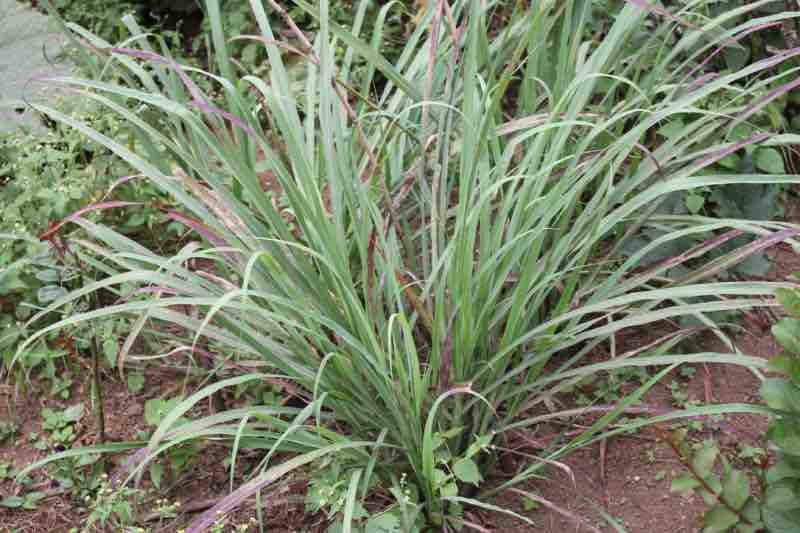 A strong lemongrass plant
A strong lemongrass plantUse your secateurs to snip off the stems about 6" from the base and put them into some potting soil. A few teaspoons of vermicompost from a worm farm does help to stimulate the growth of the roots.
The material expressed on this page is gleaned from the nutritional and environmental literature; it is clearly referenced. A plain distinction is made between the author's opinion and that which is scientifically proven. When in doubt consult your health professional.
To suggest a correction or clarification, write to Dr Bernard Preston here. Contact.
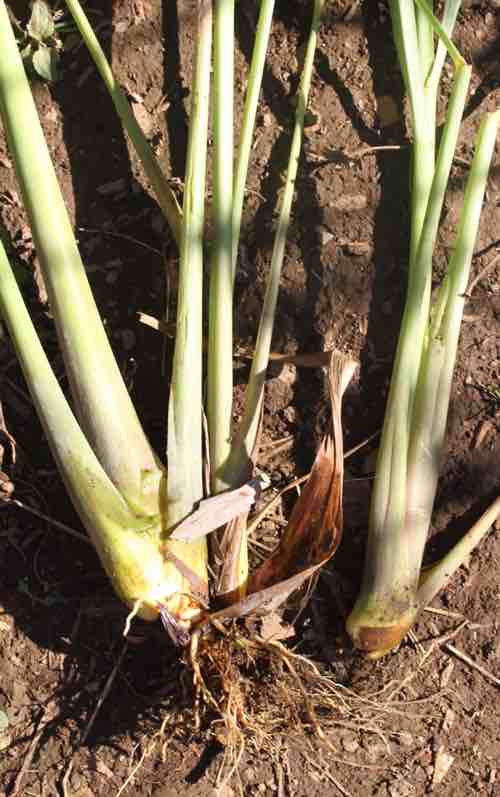
Keep the roots moist. Within a few weeks the plant will begin to shoot. Don't fuss about the weeds; that is sweet basil in the background by the way with its purple flowers that the bees adore.
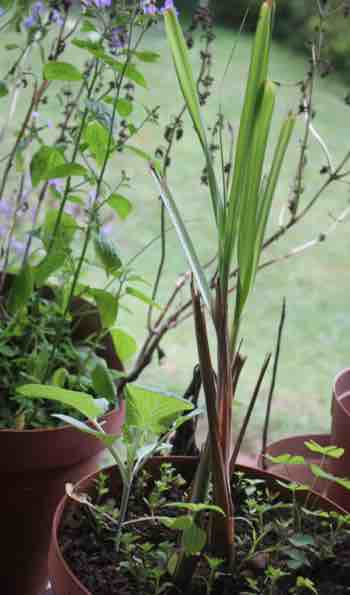
Once you are confident the roots have taken then plant it out in the garden; in a sunny spot but not up against a hot wall. Within a year or two you'll have more than enough lemongrass for your cooking.
Split the lower 6" lengthwise with a sharp knife; discard the tough outer layers.
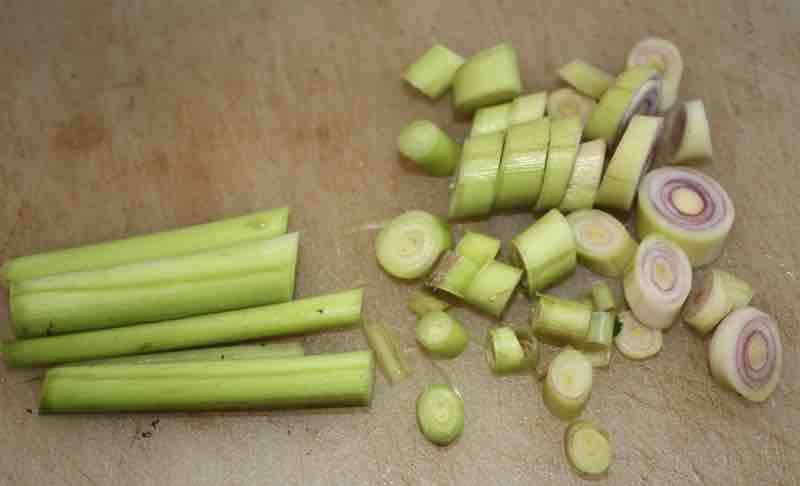
The plant is quite frost-resistant; it thrives with a minimum of fuss, requiring very little watering. How I love herbs like lemongrass.
You will never need to plant it again. Slowly the base will expand so that you can share it with your friends and family.
It gives the divine flavour of Thai cooking to soups, stews and curries; it's so versatile. You can use it in a herb tea; there is research confirming that it acts as a diuretic if you suffer from swollen ankles in the heat of summer[1].
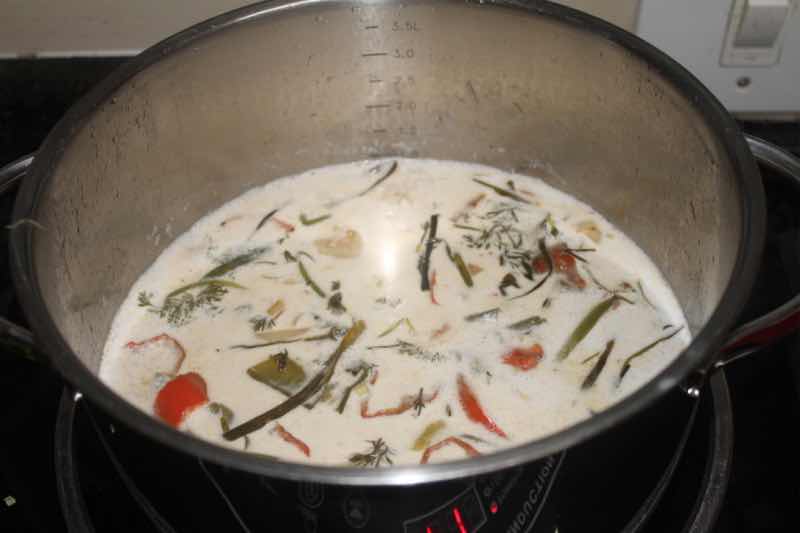
This spicy Thai curry soup is one of our favourites; it's so easy to make. To increase the flavour you may want to use some of the tough outer layers; leave them in long lengths so they are easy to find and remove before liquidising.
With no research to confirm that it is important, we have the feeling that it's best to use vegetables from the garden that are in season. So in summer our Thai soup with lemongrass would have sweet potatoes; in autumn it would be susus and butternut in winter.
How to care for lemongrass
How to care for lemongrass is really a piece of cake; get it established and you can neglect it for long periods. It does not require watering.
What is lemongrass good for?
Mukarram et al have shown that lemongrass is rich in three of the four vitamins known to be essential in the prevention of frailty syndrome; namely C, E and folate.
"You can't help getting older but you do not have to get frail."
- George Burns of Two Ronnies fame
Lemongrass is also rich in several important minerals, for example Potassium. That would explain the role it plays in lowering blood pressure.
It is also rich in magnesium, zinc and iron, all extremely important in helping detoxify homocysteine and preventing anaemia.
Various studies have shown that lemongrass essential oil has antiseptic properties; further research is looking to confirm its role in helping to prevent cancer.
Beekeepers use a dab of the essential oil in trap-hives to attract migratory swarms.
When browsing use right click and "Open Link in New Tab" or you may get a bad gateway signal.
Newsletter
Our newsletter is entitled "create a cyan zone" at your home, preserving both yourself and Mother Earth for future generations; and the family too, of course. We promise not to spam you with daily emails promoting various products. You may get an occasional nudge to buy one of my books.
Here are the back issues.
- Lifestyle and ideal body weight
- What are ultra-processed foods?
- Investing in long-term health
- Diseases from plastic exposure
- Intensive lifestyle management for obesity has limited value
- A world largely devoid of Parkinson's Disease
- The impact of friendly bacteria in the tum on the prevention of cancer
- There's a hole in the bucket
- Everyone is talking about weight loss drugs
- Pull the sweet tooth
- If you suffer from heartburn plant a susu
- Refined maize meal and stunting
- Should agriculture and industry get priority for water and electricity?
- Nature is calling
- Mill your own flour
- Bake your own sourdough bread
- Microplastics from our water
- Alternative types of water storage
- Wear your clothes out
- Comfort foods
- Create a bee-friendly environment
- Go to bed slightly hungry
- Keep bees
- Blue zone folk are religious
- Reduce plastic waste
- Family is important
- What can go in compost?
- Grow broad beans for longevity
- Harvest and store sunshine
- Blue zone exercise
- Harvest and store your rainwater
- Create a cyan zone at your home
Did you find this page interesting? How about forwarding it to a friendly book or food junkie? Better still, a social media tick would help.
- Homepage
- Herbs Spices
- How to Care for Lemongrass
Address:
56 Groenekloof Rd,
Hilton, KZN
South Africa
Website:
https://www.bernard-preston.com